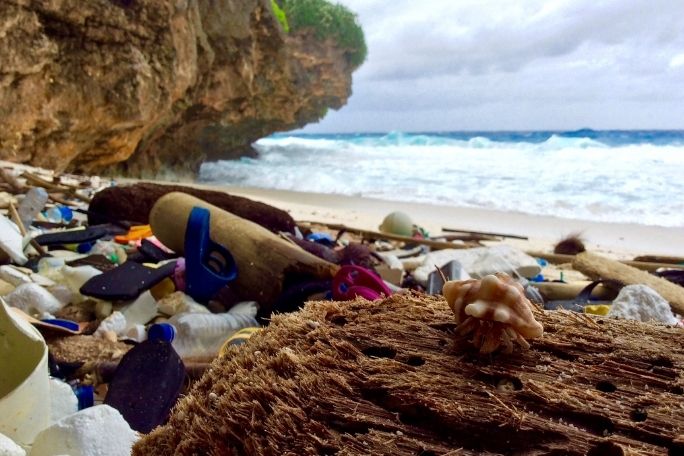Lesson summary
This lesson incorporates clips from Blue The Film as learning inspiration. In this lesson students will consider the ways individuals use language to communicate their thoughts, understandings and opinions. They will watch a short clip that explores a range of perspectives about plastic. Students will study rhetorical devices and how they can be used to persuade audiences. Students will then apply this knowledge to compare the use of rhetoric in two clips about plastic and its impact on the environment and ecosystems.
Learning intentions:
Students will...
- learn about rhetorical devices and how they can be used to persuade
- understand the impact of ideas, values and attitudes on how the issue of plastic bags and ocean change are shared.
Success criteria:
Students can...
- explain rhetorical elements and how they are used to persuade
- identify and explain the effects of specific rhetorical choices on audiences
- describe the way attitudes towards plastic bags are expressed in different ways to engage audiences.
Lesson guides and printables
Lesson details
Curriculum mapping
Australian Curriculum content descriptions:
Year 9 English:
- Understand that roles and relationships are developed and challenged through language and interpersonal skills (ACELA1551)
- Use comprehension strategies to interpret and analyse texts, comparing and evaluating representations of an event, issue, situation or character in different texts (ACELY1744)
- Identify how vocabulary choices contribute to specificity, abstraction and stylistic effectiveness (ACELA1561)
- Listen to spoken texts constructed for different purposes, for example to entertain and to persuade, and analyse how language features of these texts position listeners to respond in particular ways (ACELY1740)
General Capabilities: Literacy, Personal and Social Capability, Ethical Understanding.
Cross-curriculum priority: Sustainability.
Syllabus Outcomes: EN5-1A, EN5-2A, EN5-5C
Relevant parts of Year 9 achievement standards: Students analyse the ways that text structures can be manipulated for effect. They analyse and explain how images, vocabulary choices and language features distinguish the work of individual authors.Students select evidence from texts to analyse and explain how language choices and conventions are used to influence an audience. They listen for ways texts position an audience. Students understand how interpretations can vary by comparing their responses to texts to the responses of others.
Unit of work: Blue The Film: English – Years 9 & 10
Time required: 90 mins.
Level of teacher scaffolding: High – facilitate class discussion and assess student work.
Resources required
- Student Worksheet – one per student
- Device capable of presenting a website to the class
- Rhetorical Devices Factsheet (one per student)
- How Do We Combat Our Plastic Addiction – transcript
Skills
This lesson is designed to build students’ competencies in the following skills:
- Communication
- Collaboration
- Critical thinking
- Global citizenship
- Social skills
Additional info
Blue is a feature documentary film charting the drastic decline in the health of our oceans. With more than half of all marine life lost and the expansion of the industrialization of the seas, the film sets out the challenges we are facing and the opportunities for positive change. Blue changes the way we think about our liquid world and inspires the audience to action. Find out how to screen or download the film here. Along with the film is an ambitious global campaign to create advocacy and behaviour change through the #oceanguardian movement. To become an ocean guardian, see the website.


Welcome back!
Don't have an account yet?
Log in with:
By signing up to Cool.org you consent and agree to Cool's privacy policy to
store, manage and process your personal information. To read more, please see
our privacy policy here(Opens in new tab).
Create your free Cool.org account.
Many of our resources are free, with an option to upgrade to Cool+ for premium content.
Already have an account?
Sign up with:
By signing up to Cool.org you consent and agree to Cool's privacy policy to
store, manage and process your personal information. To read more, please see
our privacy policy here(Opens in new tab).